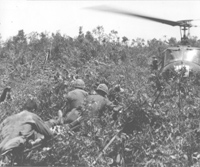The Dustoff Mystique

The identity, mission and esprit de corps that all Dustoff crews have came from one of the early commanding officers, Major Charles L. Kelly. He commanded the 57th Medical Detachment in 1964 and his motto was "No compromises. No rationalization. Fly the mission. Now." In the early days when the 57th struggled with requests from commanders to carry ammunition and troops in addition to the wounded, Kelly believed that nothing was more important than care for the wounded. He made it his mission to prove the Dustoff’s value to both the commanders and the soldiers. Kelly began a practice called "scarfing," where he would fly through the delta region asking units if they had wounded for evacuation as he flew nearby rather than sit back at the base and wait to be called for a pick up. By scarfing, Kelly picked up casualties much faster and he could pick up more wounded since he was already in the area and did not have to spend time flying from his base to the battle. He would also fly at night seeking missions, fly into any type of landing zone no matter how "hot", and would never refuse a mission despite the danger. The Dustoff crews in the units quickly learned from Kelly’s example and they also began the practice of accepting missions no matter what the situation: unsecured landing zone, bad weather, overworked crew, no gunship support, no matter what!
On July 1, 1964 Major Kelly was killed in action while trying to evacuate some US advisors and ARVN soldiers. He was warned that the landing zone he approached was unsecured and told to leave the area until it was safer to land. Kelly refused to leave without the wounded men. During his landing, his helicopter under enemy fire, a bullet pierced his heart. The entire unit was saddened by Kelly’s death, but they vowed to continue operating the unit by his example, never refusing a mission and always putting the needs of the wounded first.
They worked as hard as anybody I ever saw. They were utterly, totally committed and I know some of them must have stayed on 24 hours every time, just coming and going, and fueled up and go right back out again. So, yeah, they were something else.
- Robert Smithee, Medic with the 4th and 58th Medical Battalion [Oral History #OH0080], Transcript page 28, lines 27-30.
(listen; read; more information)
Major Kelly and Dick Anderson went into the LZ. It was hot. They were told it was hot. They got down on the ground. The soldiers on the ground were pinned down. Major Kelly, they told him to leave the LZ. They were taking fire. Major Kelly said, ‘Not until I have all your wounded.’
- Ernie Sylvester, Pilot for the 57th Medical Detachment [Oral History #OH0240], Transcript page 31, lines 14-17.
(listen part 1; listen part 2; listen part 3; read; more information)
Vietnam Center & Sam Johnson Vietnam Archive
-
Address
Texas Tech University, Box 41041, Lubbock, TX 79409 -
Phone
(806)742-9010 -
Email
vnca@ttu.edu

